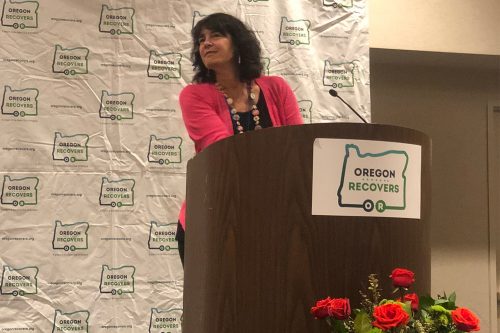
Teri Morgan was no stranger to the police. In her addiction, she was no stranger to the emergency room and the revolving door of doctors that came with it. She was no stranger to domestic violence and fearing for her life — and she was used to being ignored.
“Not one time in over 11 years did any health care professionals ever ask me if I wanted help for my drug addiction,” Morgan said. “If someone would have just sat with me and said ‘Are you okay?’ I might have gotten help sooner.”
Morgan is one of the 350 members of Oregon’s addiction and recovery community who met downtown at the Graduate Eugene hotel on June 7 for the first ever three-day Recovery Community Summit, which aims to destigmatize addiction treatment in Oregon by building a community of counselors, healthcare providers and state policy makers.
According to the 2017 National Survey on Drug Use and Health, Oregon has the fourth highest addiction rate in the United States and ranks 50th in access to addiction treatment.
Morgan got sober in 2013 and has since worked within the recovery community to make sure adequate healthcare is provided to people suffering addiction. A year ago, she began working as the program director for the Springfield Treatment Center.
“I think there’s a misconception that drug addicts can’t change,” Morgan said. “And it’s most obvious when you look at the kind of care you get from most health care professionals in Oregon.”
Mike Marshall is executive director of Oregon Recovers (OR), which helped put together the conference. He says he wants the health care system in Oregon to recognize addiction and alcoholism as a chronic illness that requires a lifetime of support and continuing care.
“The fact that the medical profession doesn’t recognize recovery as something that they should be invested in is a problem,” Marshall said. “A cultural change needs to happen, and the way it’s going to happen is by changing public policy.”
Early last year, Oregon Gov. Kate Brown declared addiction a public health crisis at a rally hosted by OR. In September, OR’s Walk for Recovery brought in over $120,000, more than twice the amount of their original goal, according to Marshall.
Participants spent three days in Eugene attending workshops, panel discussions and keynote presentations from some of the leading voices in Oregon’s recovery community. On Sunday, June 9, Multnomah County Commissioner Sharon Meieran spoke to a packed ballroom about the stigmas related to receiving substance abuse treatment in Oregon.
“It’s not a moral weakness. It’s not a lack of willpower or a willingness to stop using,” Meieran said. “It’s a chronic illness accompanied by significant changes in the brain. We need to have an appropriate and compassionate approach when treating pain.”
Before becoming Multnomah County Commissioner, Meieran worked as an emergency room doctor. She was often the first person of contact with addicts and alcoholics in crisis.
“The hardest pathway to recovery is through the emergency room,” Meieran said. “I see people who desperately need treatment, and I have to be the person who gives them a list of rehabs and says, ‘Hopefully they have something for you.’”
Meieran still works a couple shifts a month as an emergency physician at Kaiser Permanente NW in Portland. As a medical student in the late 1990s, Meieran says that she was given no formal training in addiction and substance abuse disorders, and that hospitals often lack the resources for long-term care.
“It’s hard not to feel frustrated and beat down by the system,” Meieran said. “The only way we’re going to get more people in recovery is by creating trusting relationships between patients and healthcare providers.”
Eugene-based treatment center Serenity Lane, which offers both inpatient and outpatient substance abuse programs around the state, doesn’t forget about their patients after they’ve competed treatment. According to Bill Ward, who completed Serenity Lane in 2008 before getting a job as their outreach services manager, former patients are always connected through the alumni program.
“We’re not a 28-day program,” Ward said. “Residential treatment is followed by over two years of outpatient treatment and a lifetime of alumni meetings. Because we know that if people can stay with us for that long, that if they’re getting the care they need for that long, they have a much higher chance of staying sober.” ν
For more information about local substance abuse treatment options, call Serenity Lane at 1-800-543-9905 or Springfield Treatment Center at 541-653-8284.